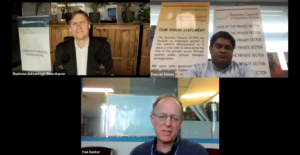The most important economic priority for Papua New Guinea is job generation, according to Douveri Henao, Executive Director of the Business Council of PNG, and Paul Barker, Executive Director of the Institute of National Affairs. Speaking at a Business Advantage PNG online briefing, they said there is an urgent need for a strategy to encourage private sector investment.
According to the Business Council of PNG’s Douveri Henao, government policy was a major source of the economic contraction in 2020, ‘apart from the general market conditions’.
This year, the government is taking a three-pronged approach to reinvigorate the economy.
‘[The government] is looking at a rescue strategy, looking at a recovery strategy for the market and a rebuilding strategy.
‘There are some sectors that have no hope of recovery,’ he explained. ‘They have bled out in 2020-2021 and they are probably going to vanish.’
Rescue
However, Henao said there needed to be a rescue strategy for affected sectors that could still recover. One such sector is tourism.
‘If the ships aren’t coming with the tourists, and the planes aren’t landing with the tourists, we still need a tourism sector and it needs a rescue strategy.’ He added that although some hoteliers and tourism operators have been able to adjust the large majority of them ‘have simply dried up’.
Some business have been able to recover, said Henao. ‘A classical example is some of the dive resorts that are not getting the international tourists on board. The dive masters have become landscape gardeners just to keep them on. But that recovery does need some boost and our energy is working on defining what that recovery should be.’
‘The critical thing for us is job retention. Keeping the Mums and Dads employed.’
Henao pointed to the signing of the fiscal agreement with Total for the Papua LNG project as a positive step in the rebuild, but noted there is a way to go. ‘We are all waiting for the real serious stuff, which is the FEED (Front End Engineering Design stage).’
He argued that the rebuild should not be just based on attracting foreign direct investment to kick start the economy but also on stimulating domestic investment.
‘There has been a lot of capex [capital expenditure] on hold across the market from large businesses. We are getting some word that the capex is coming back this year. So that will put some good money into the market and jobs. The critical thing for us is job retention. Keeping the mums and dads employed.’
Henao added that there has been a ‘major shift’ in the government’s dialogue with business because of the appointment of Ambassador Ivan Pomaleu as the Prime Minister’s Secretary. He said the dialogue and engagement with government is now regular and of a high quality, ‘which was not the case for the last five years.’
Stimulus package

From left: Business Advantage International’s Andrew Wilkins, Business Council of PNG’s Douveri Henao and National Affairs Institute’s Paul Barker.
The Institute of National Affairs’ Barker said it is difficult to measure the impact of the government stimulus package last year because the funds went to the districts, which he describes as not very accountable.
Barker believes that the PNG State has no more capacity to provide economic interventions, so the emphasis now shifts to the private sector.
‘We have to make sure livelihoods are sustained and continue their economic activities while trying to restrain the virus.’
‘You do want to be getting the best benefit from your resource sector but, if you chase the resource sector players away, you are not going to have too much to share.’
The Marape government’s strategy of Take Back PNG needs to be balanced against other imperatives, according to Barker.
‘You do want to be getting the best benefit from your resource sector, but if you chase the resource sector players away you are not going to have too much to share.
‘If ‘Take Back’ means taking away from other businesses rather than growing businesses and the economy, then you are not generating the job growth, which is the most important thing. We have had almost static, and sometimes negative, job growth over the last decade.’
Barker said because PNG’s population is growing the number of people wanting to enter the work force is also increasing. ‘The non-resource sector has been sluggish and the formal sector has been flat and sometimes going backwards. So, a critical area is to get investment and jobs being generated, rather than thinking about how can we change the ownership of the pie.
‘That means trying to encourage PNG businesses and have all the opportunities they need – trying to address the impediments to those business and also trying to encourage foreign direct investment to occur.’









Speak Your Mind